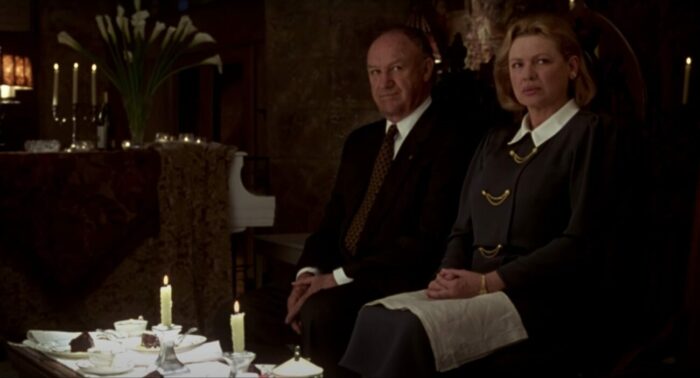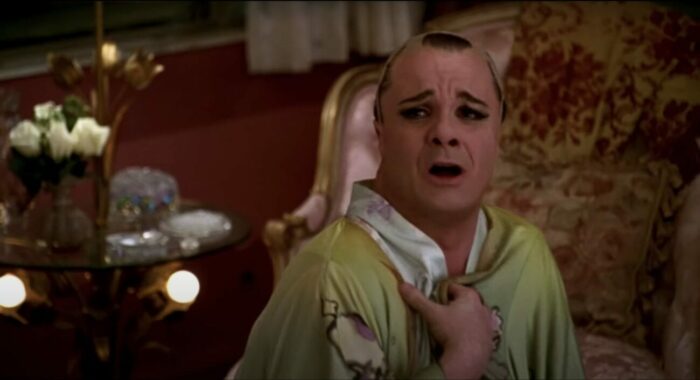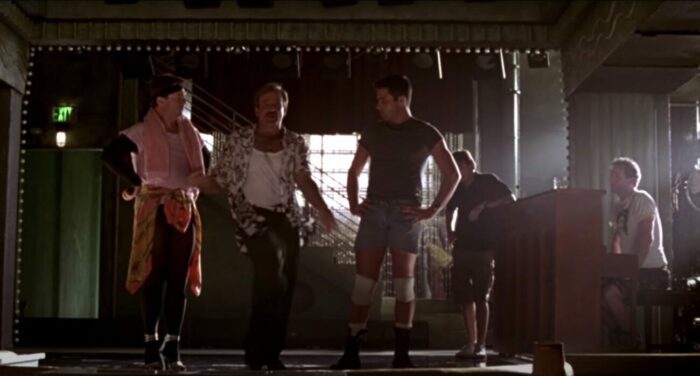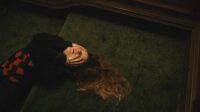There’s so much to love in The Birdcage. I don’t know what else to say before delving into this little piece of joy. The film succeeds because it doesn’t just subvert the rules; it pays them no heed at all. It dishes out some of the most loving, complex characters in comedy, certainly one of the most well-developed, admirable queer couples in cinema history. “Love” is perhaps the key word here.
The Birdcage is a 1996 film based on the French play La Cage Aux Folles about a gay couple whose son is going to marry the daughter of a conservative senator. If the name sounds familiar, La Cage also became an American musical of the same name, which I highly recommend as a pairing with The Birdcage. Robin Williams and Nathan Lane star as the gay couple: Armand Goldman (Williams) owns the fictional drag club The Birdcage in South Beach, Florida, and Albert (Lane) is the club’s flamboyant star, the appropriately named “Starina.”
Subversion of expectation is perhaps what brings this film from breathtakingly hysterical comedy to heartfelt and unique family movie. Early in the first act, Albert is throwing a fit before a drag show because he believes Armand to be seeing another man, but Armand brushes it off and accuses Albert of hysteria. Just as Albert takes the stage, we see Armand rush upstairs to prepare for a date. A young, attractive man appears, they embrace… but it’s just his son, Val (Dan Futterman), asking for permission to marry his girlfriend. This small, comic subversion of stereotype proves to be the blueprint for the rest of the film’s structure.
We soon meet Val’s fiancée, Barbara (Calista Flockhart), and her parents: conservative Senator Kevin Keeley (Gene Hackman) and Louise Keeley (Dianne Wiest). After Senator Keeley becomes embroiled in a satirically harsh political scandal during a re-election campaign, Louise convinces him that their daughter’s marriage to Val will be just the right thing to get them past it. Oh, yeah—Val and Barbara told Barbara’s parents that Armand is the cultural attaché to Greece, that Albert is a housewife, and that they are the Christian Colemans. The Keeleys head to South Beach to meet the “Colemans” for dinner, press in tow.

When I say this movie is hilarious, I mean it from the bottom of my heart. I’ve seen The Birdcage probably somewhere between 5–10 times in my life, and I still find myself laughing out loud. The first time I watched it, I literally laughed until my sides ached and found myself missing lines because of it. I would certainly do the humor a disservice by trying to describe it all here.
Every eyebrow lift, every double-take from Williams is a masterclass in restraint from such a usually bombastic comedian. Lane is magnificently eccentric and overwhelmingly effeminate, but somehow you never feel like you’re watching a performance. Albert may jump to conclusions and overreact himself into hysterics over the smallest things, but by the end of the film, you’ll understand that this was the point all along, and Lane’s exaggerated performance gets you there. Everyone is worthy of respect, regardless of how you perceive them.
Gene Hackman and Dianne Wiest play off each other magnificently. Hackman is a cardboard cutout Conservative: domineering and oblivious. Wiest is the perfect housewife on the surface: naive but surprisingly observant. Their ignorance at dinner makes the restraint of Albert and Armand all the more enjoyable in comparison, as Senator Keeley expresses thoughts like “homosexuality is one of the things that’s weakening this country!” Classic.
Hank Azaria plays the Goldmans’ gay Guatemalan housekeeper, Agador, in what may be the only genuinely borderline tasteless performance in the film. It’s not for me to say, to a Latine viewer, where the line is crossed from humorous to hurtful. I know the gay stereotypes that make up Armand and Albert are overwhelming, but they are so deeply funny (and eventually subversive) that I can forgive them, particularly because Albert is played by a gay man. It’s true that Azaria is a great comedian in his own right, and he has some brilliant physical comedy bits at the crux of the film, but it’s telling to me that you’re almost always laughing at him, where even Albert gets an arc that eventually allows you to laugh with him.
To keep up the ruse, Armand calls Val’s birth mother, Katherine (played by a sharp but warm Christine Baranski), who conceived Val from a one-night-stand 20 years prior. Armand and Val then decide to send Albert away for the weekend, fearing that his flamboyant and obviously homosexual aesthetic will “out” them all on the spot. When Albert becomes distraught at the idea, Armand tries to teach him to “pass” as straight. This scene results in some of Lane’s best bits in the movie, as his overblown hysteria is calmed by Williams’s rare comic “straight man” performance. Eventually, both characters realize it isn’t going to happen.
Right before the final act of the film, when the Keeleys are about to arrive, Albert walks out in a suit and tie (what you might call “straight” drag), and gives the act a go. Armand and Val’s optimistic faces slide away as they realize that you can’t hide Albert. “You’re thinking that… dressed this way, I’m even more obvious… aren’t you?” That’s the point. You should never have to change who you are to please other people. Perhaps a clichéd moral nowadays, but coming from a gay actor in the 1990s, it feels quite important.

The resulting switcheroo reveals quite a lot under the surface (and is genuinely, ridiculously hysterical): Albert stops trying to be someone he’s not and instead appears at the dinner, in drag, as Val’s mother. “She” is calm, poised, and utterly relaxes the Keeleys into believing they’re in a heterosexual household. It is Armand, on the other hand, who goes absolutely berserk trying to be a straight dad. He nearly gives up the game a couple times—shaking Senator Keeley’s hand too firmly, frantically ladling soup into bowls with naked men on them—enough to make Armand the member of Val’s family that the Keeleys are concerned by. Val, Agador, and Armand completely fall apart by the end of the night. Albert does not.
There’s another little sleight-of-hand trick in the film in that the two older couples—Armand and Albert, and the Keeleys—are both stereotypes on the surface. You expect it from a comedy; you go to a movie called The Birdcage about a drag club and you expect, well, what Nathan Lane gives. What you might not expect is the humanity he is offered behind all the screaming and the fits of passion. By the midway point of the movie, both Armand and Albert are humanized past their more stereotypical traits, so when you get to the final act—as gut-wrenchingly hysterical as it is—you can’t stand to see them repress themselves.
Kevin and Louise Keeley reveal their true natures throughout the film as well, as Louise begins to pull the strings to allow Barbara to get married and Kevin proves to be an insensitive narcissist. The point of the parallels between these characters is that it was, in fact, Armand and Albert—the couple who began the film squabbling incessantly—who had the healthier marriage. Kevin and Louise Keeley, our prototypical “American family,” end the film fighting.
Lest you think the film is trying to pull “both sides” of an argument or compare the way the gay couple is oppressed to the way Senator Keeley has been hiding from the press, rest assured: that is not the case. A lesser film might hammer in the point of “living in each other’s shoes” or “straight people really aren’t so bad after all!” Not this one. I won’t give away the end of the movie for you, but the long and short of it is this: queerness saves the day for everyone. Albert and Armand choosing to steadfastly be themselves and forcing the Keeleys to stand there and be part of it is what gives us our happy ending.
The moral about being true to oneself might apply even more to Armand than to Albert. While Albert’s connection to it might be obvious—he describes himself as a freak, is frequently reduced to hysterics at the thought of Armand leaving him, and is worried about not being beautiful enough—at the end of the day, he knows who he is and isn’t waiting around for anyone to give him permission to be so.
Armand’s insecurities, however, have never truly left him. Armand tells Val early on that it took him 20 years to accept who he really was, but throughout the film he displays quite openly that the process is still ongoing. I am, admittedly, part of a younger generation for whom the idea of a publicly queer lifestyle is much more attainable—my ability to use the word “queer” is itself a part of that progress—but the internalized compulsory heterosexuality, fear, doubt, and self-loathing that Armand hints at has never left the LGBTQ+ community to this day.
For middle-aged gay men in the ‘90s, I cannot imagine the level of faith in oneself required to live proudly and openly. Representation of such a struggle is still incredibly scarce.
There’s a beacon of light just out of sight in The Birdcage that is, to me, what makes Armand and Albert’s relationship so remarkable. This film came out in 1996, only 10 years past the height of the AIDS epidemic in America. The Presidential Commission on the HIV Epidemic was only created by President Reagan in 1987, years after the disease began wiping out swaths of queer men. And god damn if it isn’t beautiful to see a joyful and hilarious film centered around a complex and adoring relationship between two middle-aged men—gay middle-aged Jewish men: a character type even rarer. These characters who are survivors, just out of frame. We see that they have been through so much together, that they have chosen this life with each other time and time again (we see it a few times within the film’s two-hour runtime alone), and that they are enough.
What difference does it make if I say you can stay, or you say I can stay? It’s ours. -Armand
There’s a quiet scene at a bus stop a little over halfway through the movie that stops me in my tracks every time I watch. Albert and Armand have had another spat, and Albert storms off “to Los Copa,” where his cemetery plot is. Armand follows him and they sit, gently, on a pastel bench underneath an overhang with the port in the background. “You know what I gotta do?” Armand says. “I gotta sell my plot in Key Biscayne so I can get one next to you in that shithole Los Copa, so I never miss a laugh.” I won’t explain the resolution to their argument on the off chance you haven’t seen the film yet, because the moment is that touching.
It’s here that I’ll praise Williams and Lane’s incredible chemistry and explain that, in this instance, I couldn’t care less that Williams wasn’t gay. When I think of Robin Williams, I think of this performance. There are moments in this scene when Armand and Albert look into each other’s eyes with something so deep and intangible that you can’t help but feel the glow of their relationship right through the screen. There are only two cuts in the scene; the bulk of it is made up of two shots, each of Armand and Albert side by side on the bench, slowly zooming in. It is a beautiful manifestation of love and companionship between these magnificent actors.

The Birdcage is one of the rare, truly radiantly funny comedies that features an equal amount of backbone and character development to support the laughs. The final dinner scene, making up almost half of the film’s runtime, is both side-splittingly hilarious and genuinely tense. It’s a delicate act that is masterfully directed by Mike Nichols. You desperately want Val and Barbara to succeed, but at the same time you’ve followed Armand’s arc of self-determination and don’t quite want them to succeed like this. There are moments when the tension is split with such an uncomfortable joke that you fear the ruse will be discovered. By the end, somehow, everyone’s arc has come full circle.
The musical La Cage Aux Folles contains a song you may have heard of called “I Am What I Am,” which the original Albert character, Albin (or, in drag, “Zaza”) sings to Georges (Birdcage’s Armand) as a declaration of self-pride after being asked to stay out of the dinner. It is a beautiful song that never fails to send chills through my body when done right. It’s angry and fiery and defiant, and it’s overwhelmingly proud.
This is the big payoff that The Birdcage does right, in its own style, for Albert. You laugh at him in the beginning, then you see his pride. His dignity. He wants a stable life, recognition from the man he raised as his own son; he wants legal rights with his partner. He loves each feather and each spangle. Why not try to see things from a different angle?
The Birdcage exemplifies what the best comedians know to be true: people are much more willing to open their hearts when they’re already laughing.



